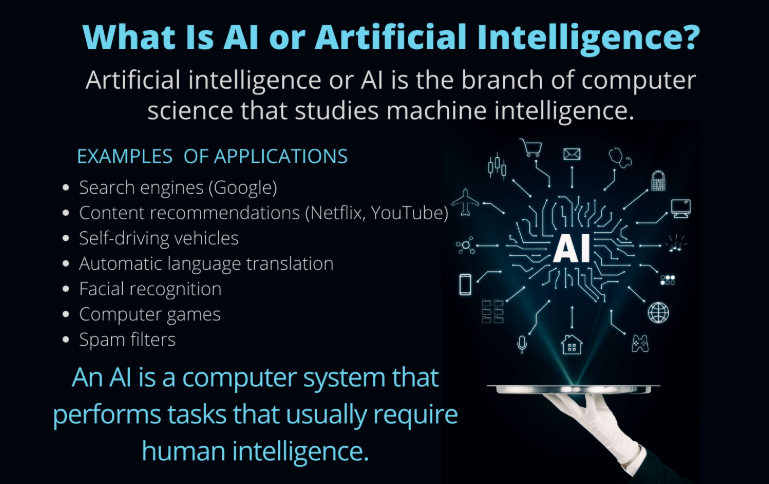2024: The Year AI Redefined Technology and Challenges Shaped its Future
(Source – Indian Express, Section – Explained, Page No. – 14)
|
Topic: GS3 – Science & Technology |
|
Context |
|
● The article explores the transformative impact of AI in 2024, highlighting its advancements, challenges, and evolving applications across industries and technologies. |
Analysis of the news:

What is AI?
● AI is the ability of a computer, or a robot controlled by a computer to do tasks that are usually done by humans because they require human intelligence and discernment.
● Although there is no AI that can perform the wide variety of tasks an ordinary human can do, some AI can match humans in specific tasks.
The Role of AI in 2024: Promise and Challenges
● AI emerged as the defining technology of the decade in 2024, with widespread adoption across industries.
● While responsible AI and greener tech made significant strides, challenges persisted in realizing tangible returns on investment.
● Many early adopters recalibrated their deployment strategies, focusing on impactful use cases.
● AI increasingly complemented human expertise as a copilot, shifting the workforce’s focus to innovation and elevated thinking.
Evolution of AI Agents
● AI agents gained traction for automating routine tasks without direct human input, creating efficiencies across domains.
● By December 2024, over 3 million custom GPTs were developed, signaling a shift beyond chat-based AI to pre-programmed agents.
● Ethical concerns arose, such as their role in decision-making and interactions, highlighting the need for accountability.
Transformation of Data Analytics
● The rise of generative AI is rendering traditional dashboards obsolete. Conversational AI tools now deliver tailored insights, visualizations, and predictions directly in response to queries.
● This evolution demands a more sophisticated approach to data collection and structuring, ensuring compatibility with advanced analytical models.
Crisis in Social Media
● Major platforms like TikTok and X faced existential challenges, while Instagram maintained growth despite questionable practices.
● Younger users shifted to private, closed-group platforms, reflecting a decline in the appeal of traditional bulletin board-style social media.
● The sector awaits a disruptive innovation to re-engage audiences.
Advancements in Computing Power
● Quantum computing breakthroughs, such as Google Willow chips and NVIDIA’s cutting-edge GPUs, are pushing the limits of AI’s capabilities.
● However, as computational power grows, concerns arise about the adequacy of existing data models.
● This could prompt a rethinking of AI development trajectories.
AI and Hardware Integration
● Attempts to embed AI into hardware faced setbacks in 2024, with early products failing to meet expectations.
● The next wave of AI-driven devices is expected to focus on specific, practical use cases, paving the way for innovations like AI-centric smartphones and laptops.
● The future promises bold experimentation in AI-hardware synergy.
Conclusion:
● The advancements in AI throughout 2024 have cemented its role as a transformative force, driving innovation while posing critical challenges in adoption, ethics, and sustainability.
● As we move forward, the focus must shift to refining AI’s applications, ensuring responsible use, and fostering a balance between technological progress and societal needs.
● The lessons of 2024 will guide the recalibration required for AI to truly unlock its potential in shaping a better future.
|
Ethical considerations & Potential risks |
|
● Algorithmic Bias: AI algorithms can perpetuate existing biases in society if trained on biased data. This could lead to unfair treatment of certain demographics when applying for benefits or receiving services. ● Privacy Issues: The use of AI in government raises concerns about data privacy and security. Citizens’ personal information needs robust safeguards to prevent misuse. ● Accountability and Transparency: When AI makes decisions that negatively impact citizens, it’s crucial to understand how the decision was reached and hold someone accountable for the outcome. ● Job Displacement: Automation through AI could lead to job losses in public service sectors. Governments need to develop retraining programs to equip workers with new skills. ● Algorithmic Warfare: AI could be misused for surveillance or manipulation, impacting democratic processes and civil liberties. |
|
PYQ: With the present state of development, Artificial Intelligence can effectively do which of the following? (2020) 1. Bring down electricity consumption in industrial units 2. Create meaningful short stories and songs 3. Disease diagnosis 4. Text-to-Speech Conversion 5. Wireless transmission of electrical energy Select the correct answer using the code given below: (a) 1, 2, 3 and 5 only Ans: (b) |
|
Practice Question: Examine the transformative role of Artificial Intelligence (AI) in 2024 for industries and society. How can responsible AI practices ensure equitable and sustainable progress? (250 Words /15 marks) |
For more such UPSC related Current Affairs, Check Out HCES 2023-24: Rising Food Expenditure, Narrowing Urban-Rural Gap, and Declining Inequality Highlight India’s Shifting Consumption Trends
